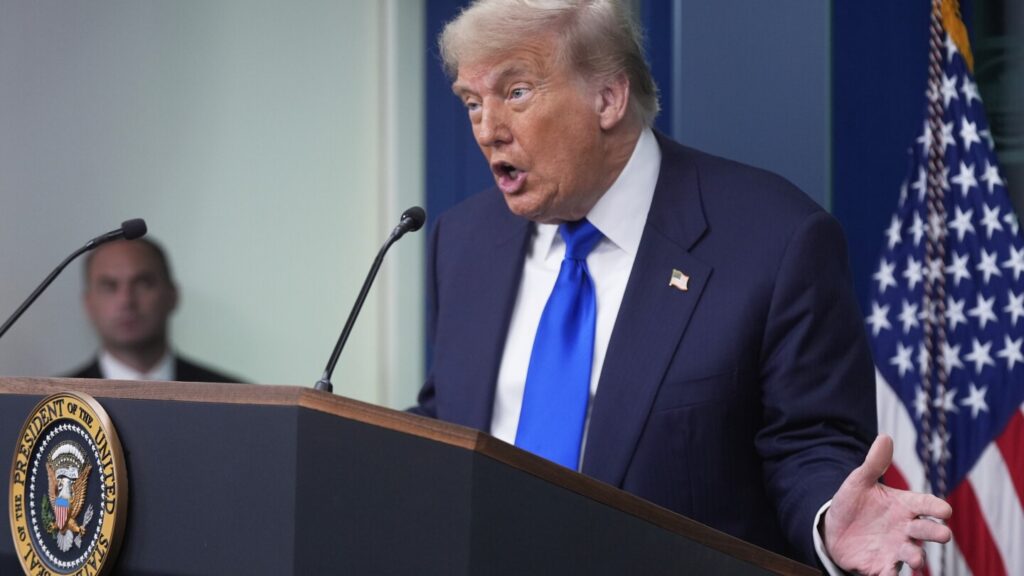
WASHINGTON (AP) — President Donald Trump announced on Friday that he is suspending trade negotiations with Canada due to its decision to implement a digital services tax on technology firms. Trump described the tax as “a direct and blatant attack on our country.”
The announcement was made via a post on Trump’s social media platform, where he stated that Canada had informed the United States of its intention to proceed with the tax, which targets both Canadian and foreign companies engaging with online users in Canada. The tax is scheduled to take effect on Monday.
“Based on this egregious Tax, we are hereby terminating ALL discussions on Trade with Canada, effective immediately. We will let Canada know the Tariff that they will be paying to do business with the United States of America within the next seven day period,” Trump declared in his post.
Trade Tensions Escalate
Trump’s decision marks another turn in the ongoing trade tensions between the two countries since he began his second term in January. The relationship with Canada has been tumultuous, with Trump often making provocative statements about the possibility of Canada becoming a U.S. state.
Canadian Prime Minister Mark Carney responded on Friday, emphasizing that Canada would continue negotiations in the best interest of its citizens. “It’s a negotiation,” Carney stated, underscoring the complexity of the discussions.
Trump, however, expressed confidence that Canada would eventually remove the tax, citing the economic leverage the U.S. holds over its northern neighbor. “Economically we have such power over Canada. We’d rather not use it,” Trump said from the Oval Office. “It’s not going to work out well for Canada. They were foolish to do it.”
The Digital Services Tax
The digital services tax will impose a 3% levy on revenue generated from Canadian users by companies such as Amazon, Google, Meta, Uber, and Airbnb. The tax will apply retroactively, potentially resulting in a $2 billion bill for U.S. companies by the end of the month.
“We appreciate the Administration’s decisive response to Canada’s discriminatory tax on U.S. digital exports,”
said Matt Schruers, chief executive of the Computer & Communications Industry Association, in support of Trump’s stance.
Prior to this development, the U.S. and Canada had been discussing the reduction of tariffs imposed by Trump on various goods from Canada. These include 50% tariffs on steel and aluminum and 25% tariffs on automobiles. Additionally, a 10% tax on imports from most countries is in place, with potential increases looming as the 90-day negotiation period nears its end.
Economic Implications
The trade relationship between the U.S. and Canada is significant, with about 60% of U.S. crude oil imports and 85% of electricity imports coming from Canada. Furthermore, Canada is the largest foreign supplier of steel, aluminum, and uranium to the U.S., and possesses 34 critical minerals and metals that are of interest to the Pentagon.
Approximately 80% of Canada’s exports are destined for the U.S., highlighting the deep economic ties between the two countries.
Despite the ongoing tensions, Treasury Secretary Scott Bessent declined to comment on the situation after a private meeting with Republican senators, stating only, “I was in the meeting,” before moving on to other questions.
Looking Ahead
The suspension of trade talks and the potential imposition of new tariffs could have significant economic ramifications for both countries. As the deadline for the digital services tax approaches, the international business community will be closely watching for any signs of resolution or further escalation.
With trade negotiations at a standstill, the focus will likely shift to diplomatic efforts and economic strategies that could influence future discussions. The coming weeks will be critical in determining the direction of U.S.-Canada trade relations.
Gillies reported from Toronto. Associated Press writers Will Weissert, Joey Cappelletti, and Paul Wiseman in Washington contributed to this report.





